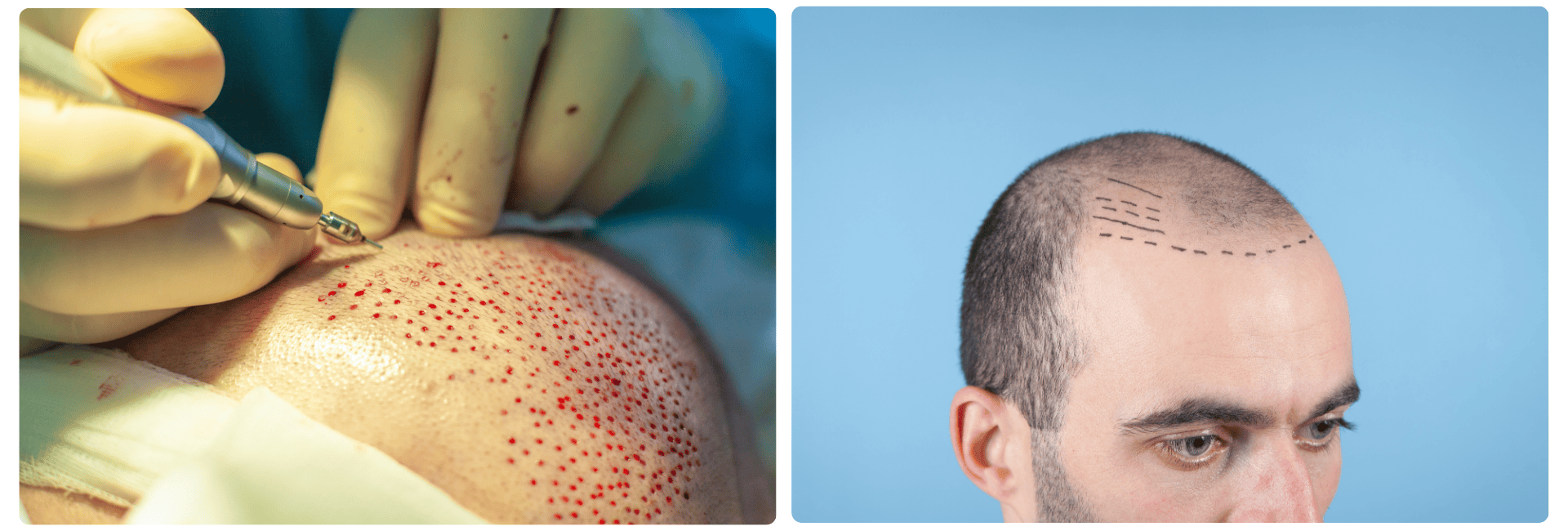
The costs of a hair transplant
Hair loss can be a significant concern for many individuals, affecting self-esteem and confidence. As the pursuit of hair restoration gains popularity, it's essential to grasp the intricacies of the costs associated with a hair transplant. In this blog post, we will explore the various factors influencing the expenses of a hair transplant, providing prospective candidates with valuable insights into what to anticipate.
Factors Impacting hair transplant costs
1. Type of hair transplant
The approach to hair transplantation can vary, with two primary methods: Follicular Unit Transplantation (FUT) and Follicular Unit Extraction (FUE). FUT involves the removal of a strip of scalp, while FUE involves individual follicle extraction. FUE, being a more intricate procedure, generally incurs higher costs.
2. Number of grafts
The number of grafts required to achieve the desired level of hair restoration directly influences the overall cost. The more extensive the area to be covered, the higher the number of grafts needed.
3. Surgeon's expertise
The experience and reputation of the surgeon play a crucial role in determining costs. Highly skilled and sought-after surgeons may charge higher fees due to their expertise and the quality of their results.
4. Geographic location
The geographical location of the surgical facility can impact costs. Urban centers or regions with a higher cost of living may have higher associated expenses.
5. Additional fees
Beyond the main surgical costs, patients should consider additional fees such as consultation charges, anesthesia fees, post-operative care, and any prescribed medications.
Average costs of hair transplant
While costs can vary, here is a general overview:
- FUT hair transplant: The cost for FUT typically ranges from $4,000 to $15,000.
- FUE hair transplant: FUE procedures tend to be pricier, with costs ranging from $5,000 to $20,000.
- Per graft pricing: Some clinics charge per graft, with prices ranging from $3 to $8 per graft.

Hair Transplant costs around the world
Hair transplant costs can vary significantly depending on the country and region where the procedure is performed. Below is a comparison of prices in 20 different countries, converted into US dollars (USD) for clarity:
- United States: $4,000 - $15,000 USD
- United Kingdom: £4,000 - £10,000 GBP (approx. $5,300 - $13,200 USD)
- Canada: $4,000 - $12,000 CAD (approx. $3,100 - $9,400 USD)
- Australia: $5,000 - $15,000 AUD (approx. $3,700 - $11,000 USD)
- Germany: €3,000 - €10,000 EUR (approx. $3,400 - $11,100 USD)
- France: €3,000 - €9,000 EUR (approx. $3,400 - $10,000 USD)
- Brazil: R$10,000 - R$30,000 BRL (approx. $1,900 - $5,700 USD)
- Mexico: $40,000 - $100,000 MXN (approx. $2,000 - $5,000 USD)
- Japan: ¥300,000 - ¥1,000,000 JPY (approx. $2,700 - $9,100 USD)
- South Korea: ₩3,000,000 - ₩10,000,000 KRW (approx. $2,600 - $8,500 USD)
- India: ₹50,000 - ₹300,000 INR (approx. $700 - $4,000 USD)
- South Africa: R20,000 - R80,000 ZAR (approx. $1,300 - $5,100 USD)
- UAE (Dubai): 10,000 - 40,000 AED (approx. $2,700 - $10,900 USD)
- Saudi Arabia: 10,000 - 40,000 SAR (approx. $2,700 - $10,700 USD)
- Russia: 100,000 - 500,000 RUB (approx. $1,400 - $6,800 USD)
- China: ¥20,000 - ¥80,000 CNY (approx. $3,100 - $12,500 USD)
- Spain: €3,000 - €8,000 EUR (approx. $3,400 - $8,900 USD)
- Italy: €3,000 - €10,000 EUR (approx. $3,400 - $11,100 USD)
- Netherlands: €3,000 - €8,000 EUR (approx. $3,400 - $8,900 USD)
- Switzerland: CHF 5,000 - CHF 20,000 (approx. $5,400 - $21,800 USD)
These prices are approximate and can vary based on factors such as the surgeon's experience, the number of grafts needed, and the clinic's reputation and location within each country. It's important to research thoroughly and consult with qualified professionals before undergoing a hair transplant procedure.
Considerations for prospective patients
Before deciding on a hair transplant, prospective patients should factor in the aforementioned costs along with potential follow-up treatments, post-operative care, and any additional expenses that may arise.
Embarking on the journey of hair restoration through a transplant involves both emotional and financial considerations. Understanding the costs involved and carefully selecting a skilled surgeon are pivotal steps toward achieving satisfying results and renewed confidence in one's appearance.

